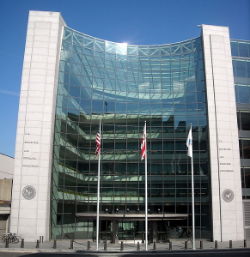The securities industry watchdog FINRA (Financial Industry Regulatory Authority) released some interesting figures this week concerning awards in their arbitration hearing process. FINRA is a regulatory arm of the SEC, and its arbitration process--which unfolds outside the US criminal justice system--resolves most forms of securities litigation between investors and broker-dealers. That’s because the vast majority of investors, whether they realize it or not, when they open their accounts with a FINRA-registered brokerage firm sign an agreement binding them to arbitration in the event of legal claims of malfeasance, misconduct, fraud, etc. For more on that, please click here.
Creative Commons, Wikimedia
...Now back to those figures. For many years, FINRA required that in claims over $100,000, at least one member of the three-person panel that sits in judgment over the arbitration process have securities industry affiliations. In practice, that generally meant that one member of the panel came from the brokerage side of the dispute. In 2011, after years of criticism and pressure, however, the SEC and FINRA changed this requirement to give investors a choice. Today, investors can choose between a panel with at least one member hailing from the securities industry; or a panel composed entirely of “public arbitrators” who do not currently have industry affiliations but may have previously worked in the securities industry.
According to FINRA’s new data, since this 2011 adjustment to the rules took effect, they have found that investors have a very small statistical edge in winning an award for damages from a panel with at least one “insider” over a panel of “public arbitrators.” Evidently, panels composed of three public arbitrators ordered brokerages to pay investors damages in 43% of cases that ended with a ruling while 44% of panels with one securities industry insider did. In other words, the results weren’t what everybody thought they would be. Statistically, there’s almost no difference in terms of getting an award between having a panel with an insider and one without.
But the statistics belie much more important information, which does not appear to be forthcoming from FINRA. As The Public Investors Arbitration Bar Association (PIABA), an Oklahoma-based group of lawyers who represent investors, has plainly stated: "The problems of the results go deeper than simply the removal of the industry arbitrator.” After all, let’s just remember that more than half of all cases that make it to arbitration go without any award whatsoever. What’s more, FINRA hasn’t provided any data regarding the amount of damages sought in the original claim versus the amount of damages actually awarded in cases won by investors.
While we’re happy to hear that some form of parity has been reached within the arbitration process, we tend to agree with PIABA that the problems run much deeper. And we’re afraid FINRA may be patting itself on the back a little too soon.

